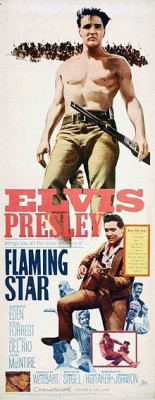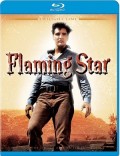| Reviews & Columns |
|
Reviews DVD TV on DVD Blu-ray 4K UHD International DVDs In Theaters Reviews by Studio Video Games Features Collector Series DVDs Easter Egg Database Interviews DVD Talk Radio Feature Articles Columns Anime Talk DVD Savant Horror DVDs The M.O.D. Squad Art House HD Talk Silent DVD
|
DVD Talk Forum |
|
|
| Resources |
|
DVD Price Search Customer Service #'s RCE Info Links |
|
Columns
|
|
|
Flaming Star
Elvis was anxious to establish himself as a serious film actor. He had the chops, mostly in the form of raw, instinctive talent, but his career choices were often vetoed by crooked manager "Colonel" Tom Parker, the self-styled Kentucky Colonel actually born in the Netherlands, and whose cut of Elvis's earnings eventually topped out at around 50%. Parker never gave Elvis much of a chance in Hollywood, even though he might have been superb in movies like West Side Story (1961), one of many offers reportedly nixed by Parker. Presley did make Flaming Star and Wild in the Country (1961) at this time, the latter with a screenplay by Clifford Odets, no less, with The King hoping to achieve some level of respectability. But their grosses paled compared to the comparatively trivial Elvis vehicles that bookended them: G.I. Blues (1960) and Blue Hawaii (1961). And so, for most of the rest of his career, Elvis kept making those kind of movies instead: lightweight travelogue-type musical comedies.
Flaming Star isn't a great Western, but it's a solidly good one. Elvis sings the title song and in the opening scene participates in a second number, but that's it. Mostly it's a grim Western about racial intolerance, unusual in that the emphasis is familial loyalties, though there are also slight allusions to the Hollywood Blacklist. The picture doesn't hold up all that well on repeat viewings, however. That's because on a second viewing one realizes Flaming Star could have been even better, less conventional in other respects, if it had tried a little harder. Regardless, it's still one of Elvis's best films, and its overall quality may surprise viewers familiar only with trifles like Paradise, Hawaiian Style and Harum Scarum.
Fox released a pretty good enhanced widescreen DVD some years back, but Twilight Time's new Blu-ray maximizes the impact of Charles G. Clarke's (Tarzan and His Mate, Violent Saturday) CinemaScope lensing.
The uncluttered plot casts Elvis as Pacer Burton, the "half-breed" son of a Texas rancher, Sam (John McIntire), and Kiowa Indian mother, Neddy (Dolores del Rio, in fact a Mexican aristocrat by birth). Together they live with Pacer's white half-brother, Clint (Steve Forrest), from Sam's previous marriage. The Burtons are friendly with the Pierce and Howard families, with Clint and Roslyn Pierce (Barbara Eden, a role intended for Barbara Steele) clearly in love, though Pacer has been pining away for her from afar, keeping his emotions in check and all too aware of perceptions about his racial impurity.
When Kiowa Buffalo Horn (Rodolfo Acosta) replaces the old chief, he launches a series of deadly raids on white families, hoping ultimately to reclaim former Indian land. His soldiers massacre all but one member of the Howard family: grimly, the only identifiable remains found amidst the ashes is the disembodied hand of a young girl.
The Burton family, with Sam's Kiowa wife and half-Kiowa son, immediately fall under suspicion. To whom do they pledge their allegiance, Dred Pierce (Karl Swenson) and his posse demand to know? Purely out of spite, the posse slaughters Sam's cattle, something the Kiowa would never do. Soon after, Buffalo Horn is at their doorstep, too, asking the same questions, albeit more diplomatically, for he covets Neddy and Pacer's endorsement of his cause. Dutiful son Pacer, who despite a loving father and brother, never entirely felt comfortable in his own skin, and now is provided with a lot of ammunition in his growing hatred of his white neighbors, especially after a couple of miners sexually assault his mother while spitting racial epithets at him. With longtime friends and neighbors turning against him, Neddy suggests they move into the Kiowa village to talk things over. Pacer goes along the idea.
Flaming Star unquestionably is Elvis's bleakest film. The Burtons are spared Kiowa murder raids because of Neddy and Pacer yet suffer more than everyone else. They are distrusted by the Kiowa and hated by the white community. The movie would be unbearable were it not obvious that, at least within the family, Sam adores his wife and loves his two sons equally, and that everyone in the family respects everyone else's judgment, even when they disagree.
That this once stable, seemingly tolerant community is so quickly and easily upended with everyone forced to choose sides - "You're either with us or against us!" - vaguely alludes to the Communist witch-hunts, something director Don Siegel had already obliquely brought to Invasion of the Body Snatchers (1956). But the story is compelling mainly because it traces the tragic disintegration of a loving family, torn apart by intolerance beyond their control.
The screenplay by Clair Huffaker and Nunnally Johnson (The Grapes of Wrath), from the former's novel, along with the acting, is very good, though one wishes The Flaming Star didn't visually resemble a typical big studio Western, and that maybe some of the dialogue and situations were handled with more subtlety. Early scenes of growing dread strongly resemble those found in the first act of John Ford's The Searchers (1956), but aren't as powerfully realized. Ford created enormous tension with very little dialogue but here everyone talks and argues too much, and too often characters see things only in black-and-white terms.
Video & Audio
Filmed in CinemaScope, the 1080p, 2.35:1 image is generally excellent, though it does appear to have been a bit overly tweaked during day-for-night scenes, which appear darker and more drained of color than they probably were in theaters. The Dolby Digital 5.1 DTS HD Master Audio is okay, but I didn't notice any real separation in terms of the dialogue or the effects, and even Cyril J. Mockridge's score seems to benefit only slightly. A 2.0 DTS-HD MA mix is also included, along with optional English subtitles.
Extra Features
Supplements include an isolated score track, audio commentary with Lem Dobbs and Nick Redman, two trailers, and liner notes by Julie Kirgo.
Parting Thoughts
Well above average, Flaming Star is both an excellent Elvis Presley movie and a solid Western on that genre's terms, and Highly Recommended.
Stuart Galbraith IV is the Kyoto-based film historian and publisher-editor of World Cinema Paradise. His credits include film history books, DVD and Blu-ray audio commentaries and special features.
|
| Popular Reviews |
| Sponsored Links |
|
|
| Sponsored Links |
|
|
| Release List | Reviews | Shop | Newsletter | Forum | DVD Giveaways | Blu-Ray | Advertise |
|
Copyright 2024 DVDTalk.com All Rights Reserved. Legal Info, Privacy Policy, Terms of Use,
Manage Preferences,
Your Privacy Choices | |||||||














